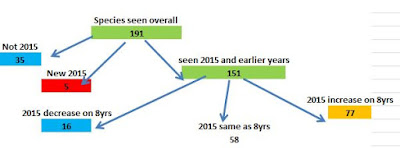While we were particularly short of observers (including this author) in the two blue months, the column showing 2015 as a % of the average for the period since 2010 shows that we are still going rather well. Thank you to all observers who have contributed observations.
As reported in the overview we added 5 species to the list in 2015:
- Blue-billed Duck is uncommon in Canberra with observations historically limited to Fyshwick Sewage Ponds. The sighting alongside Captains Flat Rd was by an observer who provided persuasive field notes. One to watch for in areas of water with good fringing vegetation.
- Pink Robin was sighted in Cuumbeun NR by an observer who provided field notes. This species is common in Tasmania and frequent in the Victorian Alps but generally reported infrequently from areas of denser vegetation in the Canberra area.
- White-fronted Chat As noted in the comparison with 2014, " They are very localised in Canberra, mainly around the vicinity of Stromlo Forest Park."
- Plumed Whistling Duck: Since New Years Eve 2009 this species has been regular in dams and ponds around Bungendore. However they have only been seen once in this area at a small dam near the end of Briars-Sharrow Rd.
- Spotless Crake A "difficult-to-see" species as they usually lurk within dense patches of vegetation beside water. This one was walking across the road to Rossi near the crossing of Yandiguinula Creek.
- Australian Wood Duck; Galah; Sulphur-crested cockatoo; Crimson Rosella; Eastern Rosella; Laughing Kookaburra; White-eared Honeyeater; Noisy Miner; Willie wagtail; Magpie-lark; Welcome swallow; Yellow-rumped thornbill; White-throated treecreeper; Common starling; Grey butcherbird; Australian Magpie; Pied Currawong; Australian Raven; Little Raven.
A simple way of summarising the difference in reporting rate between 2015 and earlier years is by a tree diagram.
The number shown as 'same' is those where the % of available months (94 in total for earlier years, 2 months are missing) is within +/- 5%. This allows for differential observer effort affecting the result by a small amount. In comparison to the situation for 2014 there are more 'increasers' with both 'decreasers' and 'the same' dropping by similar amounts..
The next table shows the number of increasers and decreasers by category of bird. (I should point out that these categories are rather arbitrary, but just provide a few groupings that cover birds of broadly similar behaviours and/or habitats.)
Many of the changes have been hinted at in earlier sections.
As noted in the 2014 report my impression is that the high number of increasers in waterbirds reflects the impact of drought in depressing the results for 2007-09. While rainfall was variable though 2015 there was water in most dams for most of the year, and the marsh filled again. Also, I at least was more aware which water features were likely to be productive (for example Musk Duck and Black Swan are nearly always observable when looking down on Foxlow Lagoon (but nowhere else).
The results for Parrots, Honeyeaters and Other larger birds all indicate a stable situation.
No group showed a noticeable drop.
The next table shows the number of increasers and decreasers by category of bird. (I should point out that these categories are rather arbitrary, but just provide a few groupings that cover birds of broadly similar behaviours and/or habitats.)
As noted in the 2014 report my impression is that the high number of increasers in waterbirds reflects the impact of drought in depressing the results for 2007-09. While rainfall was variable though 2015 there was water in most dams for most of the year, and the marsh filled again. Also, I at least was more aware which water features were likely to be productive (for example Musk Duck and Black Swan are nearly always observable when looking down on Foxlow Lagoon (but nowhere else).
The results for Parrots, Honeyeaters and Other larger birds all indicate a stable situation.
No group showed a noticeable drop.



No comments:
Post a Comment
I am very happy to receive constructive comments. However anything I deem offensive will not be published.